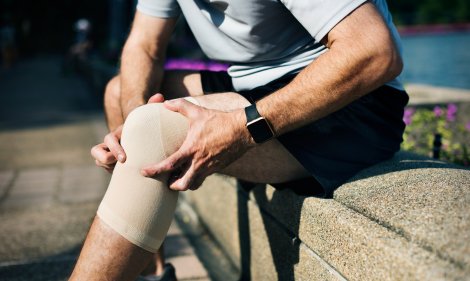Knee injuries are a common but often underestimated consequence of car accidents. The sudden impact or twisting motion during a collision can cause ligament tears, meniscus damage, fractures, or dislocations.
At Specialty Care Clinics, our orthopedic specialists use advanced diagnostics and personalized treatment plans to ensure patients regain full knee function safely and efficiently.

How Car Accidents Cause Knee Injuries
Knee injuries often result from:
- Direct Impact: Hitting the dashboard or car interior during a collision
- Twisting Motions: Sudden jerks can tear ligaments or meniscus cartilage
- Seatbelt Pressure: Can lead to bruising or joint strain
- Airbag Deployment: The force may push the knees into the dash or seat structur
Even low-speed accidents can result in serious knee damage that requires prompt attention.
Common Knee Injuries After a Car Accident
- ACL and PCL Tears
- Ligaments that stabilize the knee can be partially or completely torn.
- Symptoms: Instability, pain, swelling, difficulty walking
- Ligaments that stabilize the knee can be partially or completely torn.
- Meniscus Tears
- Cartilage that cushions the knee may tear due to twisting or impact.
- Symptoms: Pain, stiffness, locking or clicking sensations
- Cartilage that cushions the knee may tear due to twisting or impact.
- Knee Fractures (Patella, Tibia, Femur)
- Broken bones may occur from direct blows.
- Symptoms: Severe pain, swelling, bruising, difficulty bending the knee
- Broken bones may occur from direct blows.
- Dislocations
- The knee joint may be displaced, damaging ligaments, cartilage, and nerves.
- Symptoms: Visible deformity, intense pain, immobilit
- The knee joint may be displaced, damaging ligaments, cartilage, and nerves.
- Soft Tissue Injuries
- Strains or bruising of muscles, tendons, and ligaments.
- Symptoms: Pain, swelling, tenderness
- Strains or bruising of muscles, tendons, and ligaments.
Recognizing Symptoms That Require Immediate Attention
Seek medical care if you notice:
- Persistent or worsening knee pai
- Swelling or bruising
- Inability to bear weight or walk
- Clicking, popping, or locking of the joint
- Visible deformity or instability
Early intervention prevents long-term joint damage and mobility issues.
Diagnosis at Specialty Care Clinics
We use a thorough approach to assess knee injuries:
- Physical Examination: Range of motion, stability, and tenderness
- X-rays & CT Scans: Detect fractures or bone displacement
- MRI Imaging: Visualize soft tissue injuries like ligament or meniscus tears
- Functional Assessment: Evaluate strength, flexibility, and joint stabilit
Accurate diagnosis ensures a tailored treatment plan for faster recovery.
Treatment Options for Knee Injuries
Treatment depends on injury severity:
- Mild Injuries (Sprains, Strains):
- Rest, ice, compression, elevation (RICE)
- Pain management and anti-inflammatory medication
- Physical therapy to restore mobility
- Rest, ice, compression, elevation (RICE)
- Moderate Injuries (Partial Tears, Meniscus Damage):
- Targeted rehabilitation exercises
- Activity modification to reduce strain
- Minimally invasive surgery if conservative treatment fails
- Targeted rehabilitation exercises
- Severe Injuries (Complete Tears, Dislocations, Fractures):
- Surgical repair or reconstruction
- Immobilization and post-surgical physical therapy
- Long-term rehab for strength, stability, and range of motio
- Surgical repair or reconstruction
Rehabilitation and Recovery
Recovery varies based on the type of injury:
- Physical therapy to rebuild strength and flexibility
- Pain management and anti-inflammatory care
- Gradual return to daily activities, sports, or work
- Monitoring for chronic pain or reduced joint function
Rehabilitation is key to regaining full mobility and preventing future injuries.
Preventing Long-Term Complications
Untreated knee injuries can lead to:
- Chronic pain or swelling
- Osteoarthritis or cartilage degeneration
- Limited mobility and instability
Tips:
- Seek medical evaluation promptly after a collision
- Follow rehabilitation protocols carefully
- Avoid high-impact activities until cleared by your physician
- Use knee braces or supports as recommended
Conclusion
Knee injuries after a car accident can range from minor strains to severe ligament or bone damage. Early diagnosis, expert treatment, and guided rehabilitation are crucial for full recovery.
At Specialty Care Clinics, our orthopedic specialists provide comprehensive care to restore knee function and help patients return to everyday life confidently.
Don’t ignore knee pain after a collision — get expert care today.
Visit Specialty Care Clinics – Auto Injury
Learn more about Knee Injuries
FAQs
Q1. Can a torn meniscus heal without surgery?
Some partial tears may heal with rest and physical therapy, but complete tears often require surgical repair.
Q2. How long does recovery take for ligament injuries?
Mild sprains may heal in weeks; complete tears or surgery recovery can take 3–6 months.
Q3. When should I see a doctor for knee pain after a car accident?
Immediately — even mild pain may indicate ligament, cartilage, or bone injury.
Q4. Are knee braces effective after an accident?
Yes, braces support healing, stabilize the joint, and prevent further injury.
Q5. Why choose Specialty Care Clinics for knee injury treatment?
We provide advanced imaging, orthopedic expertise, personalized rehabilitation, and comprehensive recovery planning.
